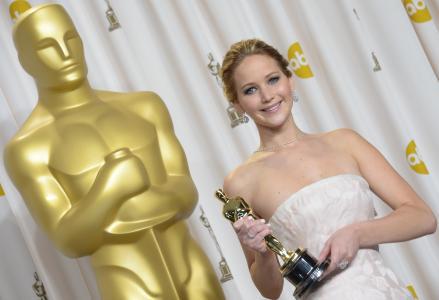Dearest Dana—
I can’t remember ever having been so excited to respectfully disagree with you. Last night’s ceremony tickled me silly with its bits of fine wit and roughed me up with rasps of coarse humor, particularly during its first 75 minutes—the stretch from the boob-ogling opener to the early appearance (as presenter) of a touchingly nervous Ben Affleck. The show went slack in its middle epoch, as usual. Nonetheless, as a knee-jerk MacFarlane skeptic who predicted that the producers and the host would crash and burn, I found myself eating those words like so much popcorn. This was the best Oscar broadcast I can remember. Granted, the forgetability of the broadcast has historically been its defining feature, but MacFarlane’s edge was welcome and honed so as to complement the musical numbers: The ego-teasing, loser-mocking show-closing duet between MacFarlane and Chenoweth glinted with a fantastic “Mack the Knife” meanness.
This was the year Oscar went up his own rear and came up smelling like roses. Please journey down a mirrored rabbit hole to understand my marveling perspective on MacFarlane’s arch postmodernism—his skill at evolving the David Letterman style of delivering show-about-showbiz winks. Please note that the opening number was couched within a clever auto-critique of a conceit: A visitor from the 23rd century—Captain James T. Priceline—appeared to the host, behaving something like the Ghost of Industry Buzz Future, and MacFarlane tweaked his act accordingly, arriving at the “Boobs” number and thus stunning the critics. A screenshot blared with a fake headline: “Best Oscars ever, says everyone except Entertainment Weekly.”
Or look again at the very funny Sound of Music gag, wherein the host, preparing for Christopher Plummer, directed our gaze to a door that didn’t open—until an officer with a Nazi armband rushed in to announce that the Von Trapps have fled. Here was a moment that romanced the movies sentimentally even as it toyed with form like a wiseacre. (“So that’s—that’s that joke,” the host said after the laughter died, in a typical bit of punctuation.) That’s how the show went: wheels with wheels, singing about Singing in the Rain, self-awareness played to the extreme, life and art blurring, the giddy-making sense of media talking to itself on an endless feedback loop. I’m dying to read a Donald Bogle analysis on the fact that the orchestra—piped in live from the Capitol Records Building, surely for the simple reason of the iconic quality of its platter-stack tower—played the Gone With the Wind score to celebrate the Original Screenplay triumph of Django Unchained.
Note that the In Memoriam montage began with Ernest Borgnine: How many millions of people, looking at Borgnine in the Oscar-winning Marty, immediately began free-associating to the Oscar-nominated Quiz Show? Commit to memory the perfectly circular Nora Ephron koan the montage offered: “I think the hardest thing about writing [beat] is writing.” After the montage, La Streisand materialized to memorialize Marvin Hamlisch. Her patter lead to an inevitable, tone-perfect launch pad: Marvin’s gone, “but I’ll always have …”
This is the way we were. In the context of the whole spectacle—the red-carpet roller derby, the floating FLOTUS propaganda, the pre-hype geared to make every passing media consumer feel like an insider, the glory and venality of the celebrity culture, the ads, the ads, the ads—the approach made sense. I liked the flow of knowingness and celebrity worship from the stage to the seat to the commercial breaks and back again. We heard the Fame theme in a promo for Nashville, saw Tim Burton playing himself for the sake of selling widgets, heard an elevator pitch for a screenplay from Hyundai.
And then the Left Coast threw it to the East Wing! Michelle Obama was lovely as a person, crisp as a presenter and slightly freaky as a harbinger of the pop-political future. Are we living in O.N.A.N. in the Year of Pantene Pro-V? The moment took the relationship between Washington and Hollywood to the logical next surreal level. I flashed on the Gipper and “Scrap Happy Daffy” and the thought of parties at Peter Lawford’s place.
Look, the way I see it, Entertainment Weekly can’t deliver an unbiased review of this broadcast because its top editor hosted, with Chenoweth and others, the preshow. (I’m referring to the official ABC pre-show, not the E! pre-show or the E! pre-pre-show, which featured an on-screen countdown clock to the pre-show.) But I learned how to watch the Oscars in the course of racking up 600 bylines at that magazine and thus feel qualified to pretend that I have authority to deliver a surrogate EW verdict: Best Oscars Ever. A-.
(I would have given it a B+, but Jennifer Lawrence was so gracious in recovering from her fall that I fell in love, thus the half-grade bump.)
Oh, Dana, I’ve got so much more to say, but the hour is getting late. (You know what Nora Ephron says about the difficulties of writing.) I very badly want to read your longform study of “We Saw Your Boobs” and then to argue about it, respectfully but strenuously and with reference to the Mr. Skin plotline in Judd Apatow’s Knocked Up, that great statement of retarded development and terminal self-reference in La-La Land. Yes, there was perhaps anxiety in MacFarlane jokes, but I did not detect malice, except maybe in the gag about female actors getting down to fighting weight by “giving themselves the flu,” and anyway that one was funny because it is true. I’d explore this issue further, but I want to tread carefully, for fear of giving offense, and also because any discussion of breasts at last night’s ceremony should involve Anne Hathaway, who made two important points. Dan, do you have a 10-foot-pole available to touch this subject with?
